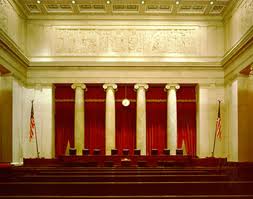United States Supreme Court Chief Justice Unlikely to Be the Court’s Most Senior Member
 Wisconsin, like a number of states, designates the senior member of its state supreme court in terms of service as the Chief Justice. The United States Supreme Court, in contrast, uses a system in which the President of the United States chooses a new Chief Justice every time the existing Chief dies or steps down.
Wisconsin, like a number of states, designates the senior member of its state supreme court in terms of service as the Chief Justice. The United States Supreme Court, in contrast, uses a system in which the President of the United States chooses a new Chief Justice every time the existing Chief dies or steps down.
Although the new Chief Justice can be chosen from the ranks of sitting justices, thirteen of the sixteen Chief Justices in U.S. history were appointed to the position from outside the court (although one, Charles Evans Hughes, was a former Associate Justice). The Associate Justices elevated to the head of the Supreme Court were Justices Edward White (1910), Harlan Fiske Stone (1941), and Wisconsin’s own, William Rehnquist (1986).
One of the consequences of this system of appointment is that it has been quite rare in American history for the Chief Justice also to be the senior justice in terms of service on the court. Ordinarily the senior justice is not the Chief Justice, but the justice who sits on the Chief Justice’s immediate right.
Only four times in the Court’s 200+ year history has the Chief Justice also been its most senior member.
The first occasion came following the death of Justice Bushrod Washington in 1829. With Washington’s death, his Federalist colleague Chief Justice John Marshall became the Court’s senior member and continued to be until his death in 1835.
The other three Chief Justices to achieve “senior-most justice” status, were, not surprisingly, the three Chief Justices appointed from the ranks of the Associate Justices.
Following the death of John Marshall Harlan the elder in October of 1911, Chief Justice Edward White, who had only been Chief Justice for 10 months, but who had served on the Court since 1894, became the senior member and remained so until his death in May 1921. Harlan Fiske Stone (appointed in 1925) was already the senior member of the Court when he was appointed Chief Justice in 1941, a position he held until his death in 1945. (Stone’s seniority may have been the reason why President Franklin Roosevelt chose the liberal Republican over numerous Democratic contenders for the honor.)
The most recent Chief Justice to achieve senior justice status was William Rehnquist. Following the retirements of Associate Justices Byron “Whizzer” White and Harry Blackmun in 1993 and 1994, respectively, Rehnquist (appointed 1973) became the Court’s longest-serving member. He also served longer in that dual capacity, from August 3, 1994 (the day of Blackmun’s retirement), to September 3, 2005 (Rehnquist’s death), a period of 11 years and one month.

 Recently, in United States v. Jones, the Supreme Court ruled that the attaching of a GPS tracking device to a suspect’s car without his knowledge and monitoring of the vehicle’s movements violated the suspect’s Fourth Amendment rights against unreasonable search and seizure. See generally 132 S.Ct. 945 (2012). In so doing, the Court resurrected an idea relating to Fourth Amendment law that had been dormant for almost 50 years – the idea of common-law trespass as a test for violations of the amendment.
Recently, in United States v. Jones, the Supreme Court ruled that the attaching of a GPS tracking device to a suspect’s car without his knowledge and monitoring of the vehicle’s movements violated the suspect’s Fourth Amendment rights against unreasonable search and seizure. See generally 132 S.Ct. 945 (2012). In so doing, the Court resurrected an idea relating to Fourth Amendment law that had been dormant for almost 50 years – the idea of common-law trespass as a test for violations of the amendment. Marquette University Law School is fortunate to welcome this week the Hon. Jeffrey S. Sutton of the U.S. Court of Appeals for the Sixth Circuit. Judge Sutton will deliver our annual Hallows Lecture on Tuesday, February 28, at 4:30 p.m. in the Appellate Courtroom of Eckstein Hall. His lecture, titled “Barnette, the Roosevelt Appointees, and the Progressive Embrace of Judicial Review,” focuses on Board of Education v. Barnette, the U.S. Supreme Court’s 1943 decision holding that the First Amendment protected students unwilling on religious grounds to salute the American flag. The 6-3 decision overturned Minersville School District v. Gobitis, a 7-2 decision only three years earlier. Appointees of Franklin D. Roosevelt were central in this drama: Robert H. Jackson wrote for the Court in Barnette, over the dissent of Felix Frankfurter, who had authored Gobitis but found himself abandoned by William O. Douglas and Hugo L. Black. Judge Sutton will discuss how this reversal of course happened so quickly and why it marked a turning point away from the progressive opposition to many forms of judicial review. The lecture is free and open to the public (
Marquette University Law School is fortunate to welcome this week the Hon. Jeffrey S. Sutton of the U.S. Court of Appeals for the Sixth Circuit. Judge Sutton will deliver our annual Hallows Lecture on Tuesday, February 28, at 4:30 p.m. in the Appellate Courtroom of Eckstein Hall. His lecture, titled “Barnette, the Roosevelt Appointees, and the Progressive Embrace of Judicial Review,” focuses on Board of Education v. Barnette, the U.S. Supreme Court’s 1943 decision holding that the First Amendment protected students unwilling on religious grounds to salute the American flag. The 6-3 decision overturned Minersville School District v. Gobitis, a 7-2 decision only three years earlier. Appointees of Franklin D. Roosevelt were central in this drama: Robert H. Jackson wrote for the Court in Barnette, over the dissent of Felix Frankfurter, who had authored Gobitis but found himself abandoned by William O. Douglas and Hugo L. Black. Judge Sutton will discuss how this reversal of course happened so quickly and why it marked a turning point away from the progressive opposition to many forms of judicial review. The lecture is free and open to the public (